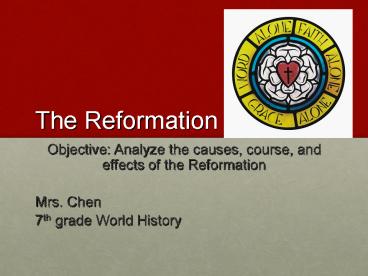The Reformation - PowerPoint PPT Presentation
1 / 16
Title:
The Reformation
Description:
The Reformation Objective: Analyze the causes, course, and effects of the Reformation Mrs. Chen 7th grade World History The Weakening of the Catholic Church By the ... – PowerPoint PPT presentation
Number of Views:53
Avg rating:3.0/5.0
Title: The Reformation
1
The Reformation
- Objective Analyze the causes, course, and
effects of the Reformation - Mrs. Chen
- 7th grade World History
2
The Weakening of the Catholic Church
- By the late Middle Ages, two major problems were
weakening the Catholic Church - Corruption within the Church
- Political conflict between the monarchy and papacy
3
Criticism of the Church
- The Church owned 1/5 to 1/3 of all the lands of
Europe and Church leaders needed large sums of
money to maintain such a large institution - Many people were angered by some of the ways in
which the Church earned and spent its money
- Corruption Too often, clergy failed to live up
to their roles as spiritual leaders and many
broke their vows while some seemed to ignore
Christian values and morals altogether.
4
Criticism of the Church How they earned Money
- Europeans paid taxes to the Church, while the
Church did not have to pay any taxes to the
monarchy - Objection to the sale of indulgences, pardons
from sins. - Objection to simony, the buying and selling of
spiritual or holy things - Critics did not like how the Church spent large
sums of money on arts and their own personal
pleasures.
5
Criticism of the Church corruption
- During the Middle Ages, the church was a
political and economic institution as well as a
religious one. By the 1300s, many Catholics felt
that the church had become far too wordly and
corrupt. - Many priests, monks, and nuns broke their holy
vows not to marry or have children - Some church leaders behaved like royalty instead
of humble servants of God, living in elegant
palaces and wore jeweled robes.
6
(No Transcript)
7
Political ConflictThe Great Schism
- In 1305, Clement V was elected pope and moved the
center of the Church to Avignon, France - Since then, most of the popes were French
- Other Europeans and many church officials felt
the French king was controlling the pope and
wanted to move the center back to Rome.
8
The Split
- The church split into two sides, one with a
center at Rome and the other at Avignon. - Each side elected a pope who had same powers
- This caused confusion and doubt among the
Christians and weakened the Church - In 1417 the two popes resigned and church
officials elected a new pope based in Rome who
began to unify the Church again
9
Reformers
- John Wycliffe in England questioned the popes
right to levy taxes and appoint church officials
without the kings approval. He was the first to
translate the Bible into English vernacular. - Desiderius Erasmus, a humanist from Holland,
criticized the clergy for neglecting Christian
values, but also criticized reformers for trying
to divide the Church.
10
Martin Luther Confronts the Church
- Martin Luther was a German monk and scholar who
believed that people could only be saved through
faith in Christ and disapproved of the sale of
indulgences - In 1517 in Wittenberg, Martin Luther wrote all
his complaints against the Catholic Church in his
Ninety-Five Theses and nailed it to the door of
the Castle Church
11
Luthers Ninety-Five Theses
- Main Ideas of Lutheranism
- The Bible is the only source of religious truth
and everyone should have access to it - People do not need the clergy to interpret the
Bible - Salvation can be gained through faith in Christ
(NOT the sale of indulgences)
12
Protestants
- In 1529, some German Princes made an agreement to
unite against Martin Luther and stay loyal to the
Catholic Church - Other Princes who supported Luther and signed a
protest to the agreement became known as
Protestants, a term that became the name for
any Christians who broke away from the Catholic
Church.
13
The Printed Word
- Printing the Bible from Latin to vernacular
(common local languages), as a result people
could read and interpret the Bible for themselves
(they did not need the clergy to interpret it for
them anymore)
14
Luthers Ideas Spread
- Priests who agreed with Luther preached his ideas
- Merchants spread Luthers ideas along trade
routes - Peasants used Luthers ideas to justify revolts
(humanism)
15
The Reformation Grows
- The Church of England (The Anglican Church)
- King Henry VIII wanted to divorce his wife, the
pope would not grant his divorce, so Henry
rejected the power of the pope and founded the
Church of England (Anglican Church
- Calvinism
- John Calvin believed in predestination the
belief that a persons salvation is determined
before birth and cannot be changed
16
Church Divisions
Christianity
Eastern Orthodox Catholicism
Protestantism
Lutheran Calvinist Anglican































